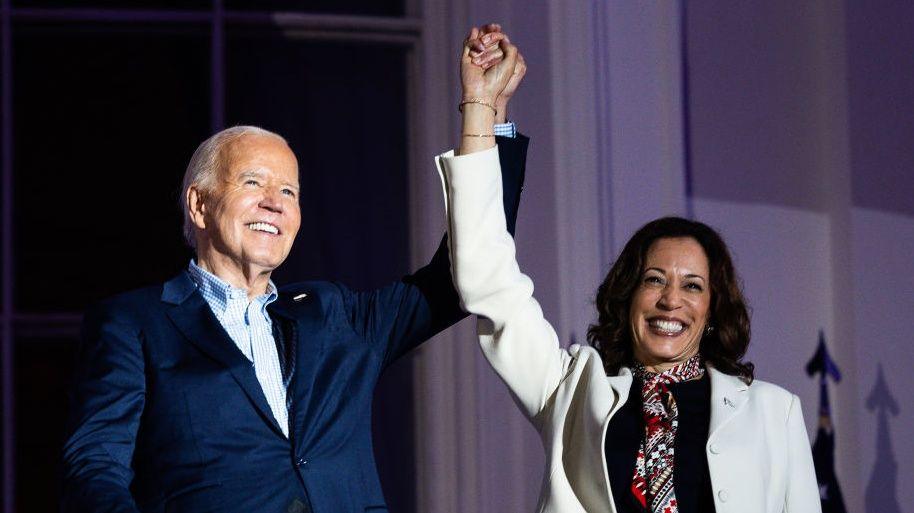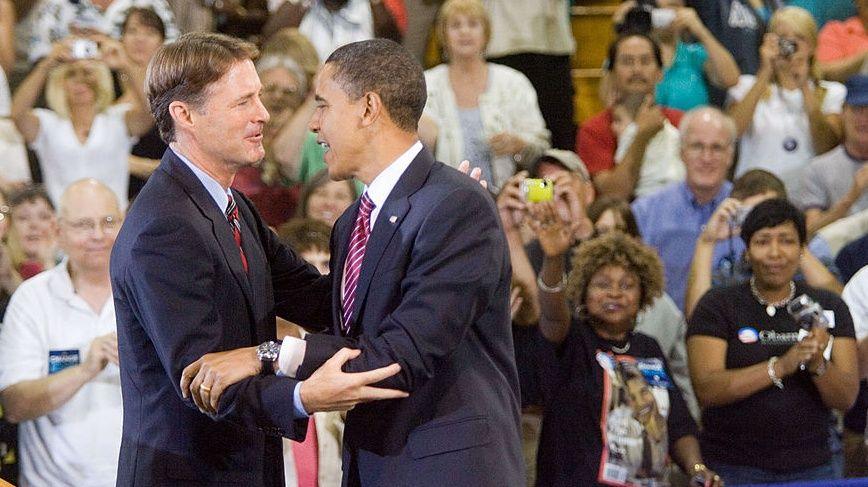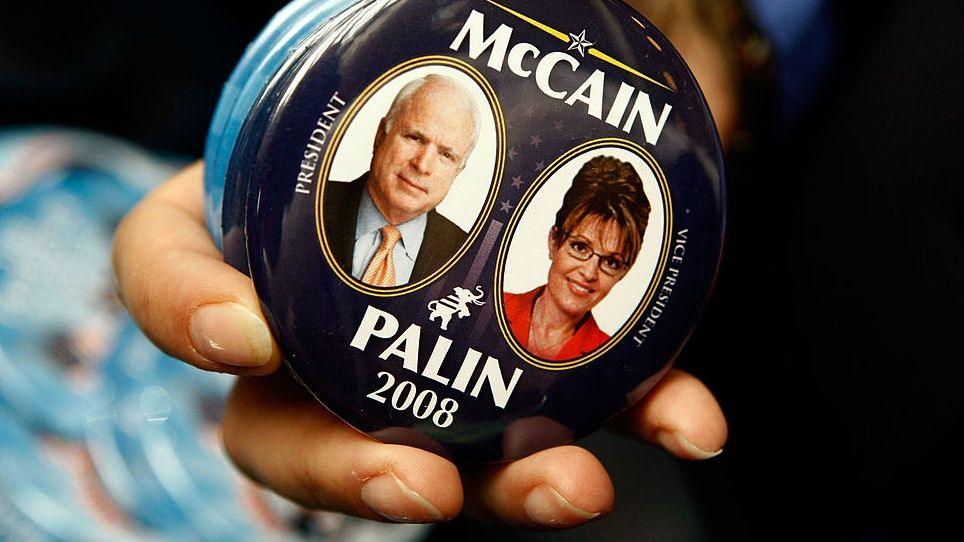Sex, money, social media - how VP contenders are vetted

Joe Biden and Kamala Harris have both been through the intensive vice-presidential vetting process themselves
- Published
As Democratic presidential hopeful Kamala Harris vets potential running mates, spare a thought for the contenders as they undergo a process that one past participant likens to "a colonoscopy performed with a telescope”.
Have you ever paid for sex?
Have you ever paid for an abortion?
Have you ever had a homosexual encounter?
This is just some of the material in questionnaires fired off during the exhaustive vetting process for previous US vice-presidential nominees.
Potential partners to join Ms Harris on the Democratic ticket for November's election will have to answer up to 200 questions before they can even begin to be seriously considered.
The vetters - campaign officials and lawyers who volunteer their billable hours for the networking and prestige - often have about a month to dig up every grain of dirt they can find.
The Harris campaign has a matter of days to pick a running mate, with a paperwork deadline looming. The vice-president, who went through the process herself only four years ago, has been assessing around a dozen contenders, with Governor Josh Shapiro and Senator Mark Kelly among those being touted.
Pete Buttigieg, who is also among the rumoured potential picks, was asked this week if the possible running mates are aware they are being vetted. "Yeah, you know," he said with a smile.
What makes the whole undertaking especially challenging is that, unlike with cabinet picks, the FBI does not perform background checks on vice-presidents.
The vetters will pore over a contender’s tax returns and medical history. They may log on to his or her private social media accounts. They will scour the social media posts of his or her children. The grandchildren’s, too.
The least suggestion of marital infidelity, or any other skeleton in the closet, will be picked apart.
They will check every record of every word the potential candidate has ever uttered or written.

Evan Bayh was vetted as a potential vice-presidential pick for Barack Obama in 2008
Jim Hamilton, a Democratic lawyer who evaluated potential running mates for John Kerry, Barack Obama and Hillary Clinton, told the BBC that notes of the process are destroyed afterwards to preserve “a strict, strict veil of confidentiality”.
He oversaw more than 200 lawyers who were tasked with finding Mrs Clinton’s running mate (she picked Virginia Senator Tim Kaine).
“Everybody's got something in their background they’d just sooner not talk about,” Mr Hamilton said. “But you'd be surprised, once people commit to the process, at how candid they are in their answers.”
Evan Bayh, a finalist to become Barack Obama’s running mate in 2008, remembers the procedure took nearly three months and was “like having a colonoscopy performed with a telescope”.
“There was a whole team assigned to me: an accountant, a lawyer, a physician, you know,” the former Indiana senator and governor told the BBC. “They talked to my wife, they talked to my father.”
Television crews were soon camped outside his house in Washington DC. Mr Bayh recalls his shock one morning as he sat down to breakfast with the television on and heard an MSNBC host remark that the senator’s bowl of yoghurt and granola “sure looks tasty”.
The head of the vetting team phoned one day to ask Mr Bayh about a false internet rumour that he had once received psychiatric treatment.
“And I said, ‘No, it's not true. But if you guys don't hurry up and make a decision, it might be true,’” he remembers joking.
A list of 20 names was whittled away. Mr Bayh says it ultimately came down to himself and Joe Biden, then a Delaware senator.
He recalls how he was flown out “very clandestinely” to St Louis, Missouri, in August that year to meet the future president in his hotel room. They spoke for around three hours.
“There was about a three-foot high stack of materials there,” he recalls, "that he [Mr Obama] just gestured to it, and he said, ‘I've gone over all the reports on you, and nothing in there bothers me.’
“He said, ‘But if there's anything that our team didn't discover, you should tell me now because it will come out.’
“And I said, ‘Well, your people did do a very thorough job. But there were probably two or three things I should mention to you.’ And I did.
“And he looked at me, he said, ‘That's it?' And I said, 'Yeah, that's it.’ And he said, ‘Well, you haven't led very much of a life, have you?’”
Mr Bayh did not elaborate to the BBC on his disclosures to Mr Obama in the hotel room, except to say they were family matters.
Mr Biden was ultimately successful. Campaign manager David Plouffe later quoted President Obama as saying it was a “coin toss” between the two.
Relive a wild month in US politics in about two minutes
Sometimes a vetter can pose a question that no-one else thought of, revealing a potential red flag, even if it’s not disqualifying.
Gary Ginsberg, who worked for the Clinton campaign in ’92, told the BBC he remembers Al Gore at a loss for words when asked during the process if he had any friends.
The reserved Tennessee senator bristled. But when pressed, he could name none, beyond his brother-in-law and two congressmen. Mr Gore’s lack of a social circle bothered one top campaign official.
From a long-list of 50, he was nevertheless picked to be running mate. They won. Mr Gore, however, would struggle to overcome low personal likability ratings.
The vetting process used to be largely informal and much less invasive, since it was seen as rude to ask a senator or governor about personal matters.
Two selection disasters changed all that forever.

More on the US election
SIMPLE GUIDE: Everything you need to know about the vote
SWING STATES: Where the election could be won and lost
Democratic VP: Five top contenders emerge in Harris VP hunt
In 1972, the Democratic White House nominee George McGovern dumped his running mate after just 18 days. He had picked Missouri Senator Thomas Eagleton based on a two-minute phone conversation and no background check.
It almost immediately emerged in media reports that Mr Eagleton had received electroshock treatment in hospital for clinical depression a decade earlier.
Nixon aides began asking reporters: “How could McGovern be trusted after putting a crazy man on the ticket?”
In that November’s election, the Republican president annihilated his Democratic challenger.
Vetters soon began to cast their nets wider, to look more closely at a potential running mate’s family members, after another embarrassment upended the 1984 White House race.
Democratic nominee Walter Mondale needed a game-changer against Ronald Reagan that year, so he picked Geraldine Ferraro, the first female running mate ever on a major party national ticket.
But the campaign was hamstrung by revelations about her real estate developer husband’s financial dealings.
President Reagan went on to win 49 states in a landslide re-election.

Sarah Palin was quickly vetted - but was soon seen as unready for the political primetime.
Sometimes a potential running mate dazzles at the audition, but fizzles on the political stage. In 2008, Republican presidential nominee John McCain’s campaign had just 72 hours to vet Sarah Palin.
The then-44-year-old Alaska governor was asked by aides how she would react in a national security crisis where the president had been temporarily incapacitated by surgery.
Under this scenario, the director of national intelligence comes to Acting-President Palin and tells her they have pinpointed Osama Bin Laden.
A plane is overhead ready to kill the al-Qaeda leader.
But there’ll be multiple civilian casualties.
“Do you take the shot?” she was asked.
“Yes,” she said, “I would take the shot because I’m the President of the United States, this is our archenemy who took the lives of 3,000-plus Americans. And then I would get down on my knees and ask for forgiveness for the innocent souls whose lives I would be taking.”
The vetters were highly impressed with this answer.
Yet after she was unveiled as the vice-presidential nominee, Ms Palin proved unable to answer a reporter’s basic question about what newspapers she read. Soon she was seen as gaffe-prone and unready for the political primetime.
Even when the vetting process is conducted with more rigour, the final decision is always up to the nominee.
George HW Bush - one of the 15 US vice-presidents who became president- went with his gut when he picked little-known Indiana Senator Dan Quayle to be his running mate in 1988.
Though they won, Mr Quayle, 41, was widely seen as more of a liability than an asset to the ticket, as recounted in the book First in Line, by Kate Andersen Brower.
The vice-presidential nominee was asked by a reporter aboard the campaign plane in 1988: “What’s the favourite book that you’ve read?”
Mr Quayle turned to his wife, Marilyn.
“What’s the favourite book I’ve read?” he asked her, leaving a nearby political aide aghast.